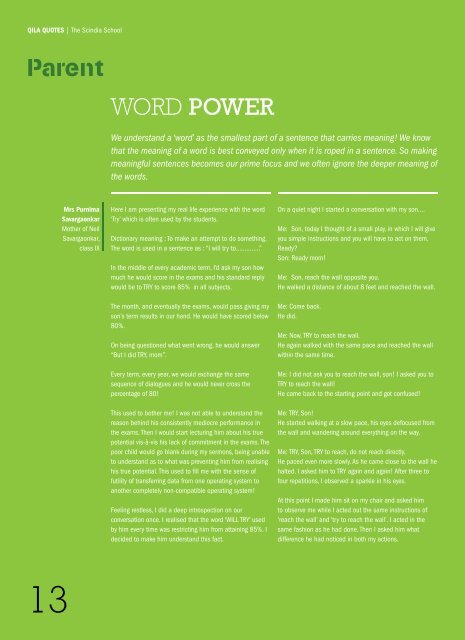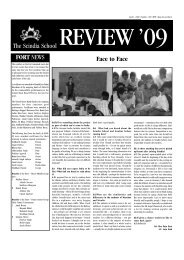15th October 2010 - The Scindia School
15th October 2010 - The Scindia School
15th October 2010 - The Scindia School
- No tags were found...
Create successful ePaper yourself
Turn your PDF publications into a flip-book with our unique Google optimized e-Paper software.
QILA QUOTES | <strong>The</strong> <strong>Scindia</strong> <strong>School</strong>ParentMrs PurnimaSavargaonkarMother of NeilSavargaonkar,class IXWORD POWERWe understand a ‘word’ as the smallest part of a sentence that carries meaning! We knowthat the meaning of a word is best conveyed only when it is roped in a sentence. So makingmeaningful sentences becomes our prime focus and we often ignore the deeper meaning ofthe words.Here I am presenting my real life experience with the word‘Try’ which is often used by the students.Dictionary meaning : To make an attempt to do something.<strong>The</strong> word is used in a sentence as : “I will try to…………..”In the middle of every academic term, I’d ask my son howmuch he would score in the exams and his standard replywould be to TRY to score 85% in all subjects.<strong>The</strong> month, and eventually the exams, would pass giving myson’s term results in our hand. He would have scored below80%.On being questioned what went wrong, he would answer“But I did TRY, mom”.On a quiet night I started a conversation with my son….Me: Son, today I thought of a small play, in which I will giveyou simple instructions and you will have to act on them.Ready?Son: Ready mom!Me: Son, reach the wall opposite you.He walked a distance of about 8 feet and reached the wall.Me: Come back.He did.Me: Now, TRY to reach the wall.He again walked with the same pace and reached the wallwithin the same time.He was discerning enough to make out that in trying I hadbeen slow and seemed quite disinterested in reaching thewall. <strong>The</strong>n I asked him how he had felt while TRYING toreach the wall. He answered that he felt he was at the task.He also acknowledged that though he managed to hit thetarget it happened at a much slower pace when he wastrying.Now I asked him if he understood the difference in thesentences “I will do a thing” and “I will TRY to do a thing”Both of us echoed the same ideas that when we say ‘I willtry’ we are hesitant to commit ourselves to achieve thetarget! We are defocused from the target, and are muchslower in our pace while walking towards it.Inspite of all the actions which an observer notices, as anactor we are satisfied with our efforts. I further added thatwhen we say “I will TRY” to a person who is giving us a targetto achieve, with full faith in our capabilities; we are simplyfooling ourselvesHe smiled with a twinkle in his eyes.Every term, every year, we would exchange the samesequence of dialogues and he would never cross thepercentage of 80!This used to bother me! I was not able to understand thereason behind his consistently mediocre performance inthe exams. <strong>The</strong>n I would start lecturing him about his truepotential vis-à-vis his lack of commitment in the exams. <strong>The</strong>poor child would go blank during my sermons, being unableto understand as to what was preventing him from realisinghis true potential. This used to fill me with the sense offutility of transferring data from one operating system toanother completely non-compatible operating system!Feeling restless, I did a deep introspection on ourconversation once. I realised that the word ‘WILL TRY’ usedby him every time was restricting him from attaining 85%. Idecided to make him understand this fact.Me: I did not ask you to reach the wall, son! I asked you toTRY to reach the wall!He came back to the starting point and got confused!Me: TRY, Son!He started walking at a slow pace, his eyes defocused fromthe wall and wandering around everything on the way.Me: TRY, Son, TRY to reach, do not reach directly.He paced even more slowly. As he came close to the wall hehalted. I asked him to TRY again and again! After three tofour repetitions, I observed a sparkle in his eyes.At this point I made him sit on my chair and asked himto observe me while I acted out the same instructions of‘reach the wall’ and ‘try to reach the wall’. I acted in thesame fashion as he had done. <strong>The</strong>n I asked him whatdifference he had noticed in both my actions.When we say “I will do a thing”; our brain sees THE THING asa target, and starts moving towards it.When we say “I will TRY to do a thing”; our brain can notvisualise THE THING clearly, hence doesn’t take muchinterest in moving towards it and slows down our pace ofactions.So dear, do not stop your brain from visualising the targetby saying “I WILL TRY”.My son appeared burdened by the heavy discussionsession; but his misty eyes conveyed to me that he had gotTHE MESSAGE!From that day I hear less of “I WILLTRY” from my son and am waitingfor the day when he conveys hisunderstanding of this throughhis actions.Running hard to keep the flame burning13volume 9 | oct <strong>2010</strong>
















